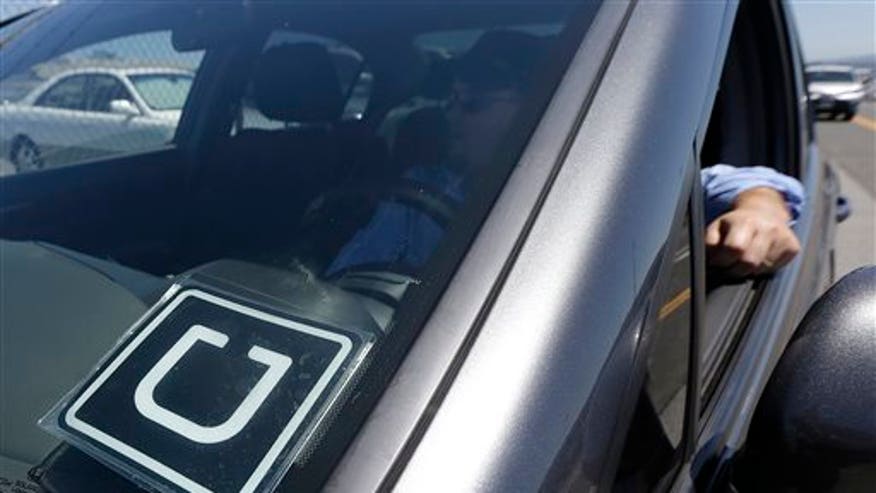
Ride-sharing services like Uber and Lyft have new ammunition in their fight to operate in cities around the world -- a study that concludes they could save thousands of lives.
The upstart services have battled the organized taxi lobby and politicians for entry into new markets around the world, but have made their case based on claims that they create jobs and provide competition that benefits consumers. Now, Temple University researchers have released a study that shows the entry of Uber into markets in California between 2009 and 2014 tracks a drop of as high as 5.6 percent in drunken-driving deaths.
"We looked at the entire state of California from 2009 to 2014," Sunil Wattal, who co-authored the study with fellow researcher Brad Greenwood, told FoxNews.com. "We wanted to demonstrate in a quantitative and robust manner the impact Uber has on drunk driving.
"We found that UberX actually reduced drunk-driving related fatalities," Wattal added.
"We found that UberX actually reduced drunk-driving related fatalities."- Sunil Wattal, Temple University
Using data from the California Highway Commission, the researchers found that UberX, the company's least expensive service, significantly reduced the number of alcohol-related motor vehicle deaths throughout the state -- with the greatest impact in the larger cities.
He noted, however, that no such link was found with Uber Black, the company's highest priced service, consisting of commercially registered and insured livery vehicles -- typically a black SUV or luxury sedan with a significant markup over traditional taxicabs.
The researchers theorized that the Uber Black's higher cost and lower accessibility might explain why it does not provide the same benefit as the no-frills version of Uber.
"Economically, results indicate that the entrance of Uber X results in a 3.6 percent to 5.6 percent decrease in the rate of motor vehicle homicides per quarter in the state of California," the two concluded. "With more than 1,000 deaths occurring in California due to alcohol-related car crashes every year, this represents a substantial opportunity to improve public welfare and save lives."
Matt McKenna, an Uber spokesman, said the Temple University study only bolsters similar data previously collected by Uber and Mothers Against Drunk Driving (MADD), the nation’s largest nonprofit working to protect people from drunken driving and underage drinking.
"The results of this study complement research we released earlier this year with MADD that showed that the introduction of reliable and affordable transportation options like Uber are having a meaningful impact on the rates of drunk driving crashes in California," McKenna told FoxNews.com Tuesday.
Uber and MADD studied the service's impact in several major U.S. cities. Their report found that in Miami, for instance, Uber ridership peaks at the same time as historical drunken-driving related crashes. In Seattle, Uber's entry into the market was associated with a 10 percent decrease in DUI arrests, according to the report, and in Pittsburgh, the demand for Uber spikes right around the times bars close. The report also looked at traditional taxi services, claiming that taxi supply in Austin decreases when people most want rides, and when DUI arrests are most common.
Taxi cab associations, however, take issue with the study that is being used to bolster support for Uber -- claiming traditional taxi services have long helped to reduce drunken driving, while also adhering to important safety procedures.
"UberX is absolutely their most controversial product," said Dave Sutton of the group, "Who's Driving You?" -- a public safety campaign formed on behalf of the Taxi, Limousine & Paratransit Association (TLPA).
"It’s been roundly criticized for its lack of insurance and lack of rigorous criminal background checks on drivers," Sutton said of UberX.
"It should be obvious to all involved that Uber is a taxi service, and taxi service is an extension of public transportation," he told FoxNews.com. "If you have passengers relying on this service to avoid dangerous activity, such as drunk driving, then the service itself should be adhering to the best safety practices and UberX is not."
To use Uber, passengers must first create an account with the service through the app on their iPhone or Android device -- which includes the customer's name, mobile number, email, language and billing information. After logging in with a username and password, the passenger selects his or her vehicle preference -- for instance, a black car, which can seat up to four people, or an SUV, which can seat up to six. The customer then marks the pick-up location on a map with a pin and the driver uses the phone holder's coordinates to arrive at the location. The cost of the ride depends on the time and distance. During certain peak times -- like New Year's Eve -- Uber enacts what it calls "surge pricing."
"The ease of Uber is just amazing," said Colleen Sheehey-Church, president of MADD, who praised the technology of the ride-sharing service and said the Temple University study "backs up everything we have already said."
"The study does show that easier and cheaper options will have an impact," Sheehey-Church told FoxNews.com. "We’re looking to change behavior and when a person has thought about it in advance, if they have easy access with a smartphone to do one click, it's the best thing for them to do to get home safely."
Sheehey-Church, whose teenage son was killed at the hands of a drunk and drugged driver, said she also advocates traditional taxi services as well as public transportation.

